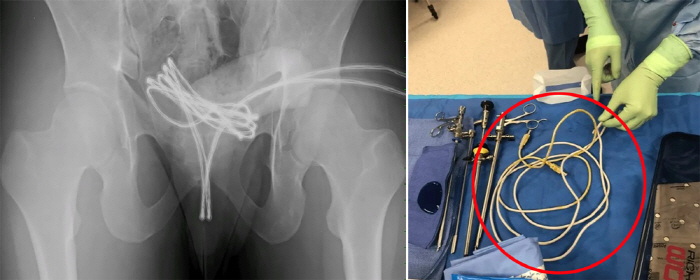1m long USB cable, college student in genital...The reason is absurd
|
In an example published in the international journal 『Cureus" by researchers at Drexel School of Medicine in Pennsylvania, a 21-year-old man A recently visited the hospital because he could not remove a USB cable after inserting it into the urethra.
He told medical staff that cotton swabs and wires have been inserted into the urethra before for sexual stimulation.
This behavior is called 'sounding', and it is an act of obtaining sexual pleasure by inserting an object into the urethra (the pipe where the urine is discharged).
According to the report, some people inserted forks, tennis racket strings, headphones, and even the head of a snake with its head removed.
However, exact statistics on how commonly sounding is done are unknown.
However, 85% of the cases where foreign substances were removed are reported to be men. In addition, about 36% of people who inserted foreign substances into their genitals were found to have mental problems.
A CT scan of Drexel Medical School showed that a USB cable about 1m long had been pushed to the man's bladder. The other half was outside the body.
Surgery was required because it was difficult to remove with a natural discharge or a simple procedure.
After general anesthesia, the medical staff carefully removed the cable while checking the inside of the urethra using an endoscope.
In a report, the researchers found that inserting objects into the urethra is rare but can lead to serious injury" he warned.
These behaviors can lead to a risk of sepsis, impotence, and bladder rupture due to urethral damage.
In addition, inserting contaminated objects also increases the risk of sexually transmitted diseases and other bacterial infections.
After surgery, the man was prescribed antibiotics and painkillers and discharged from the hospital, and a follow-up examination conducted a month later confirmed that no serious damage was left to the urethra.
The medical staff said "The patient is currently recovering normally and has no long-term sequelae."
This article was translated by Naver AI translator.




